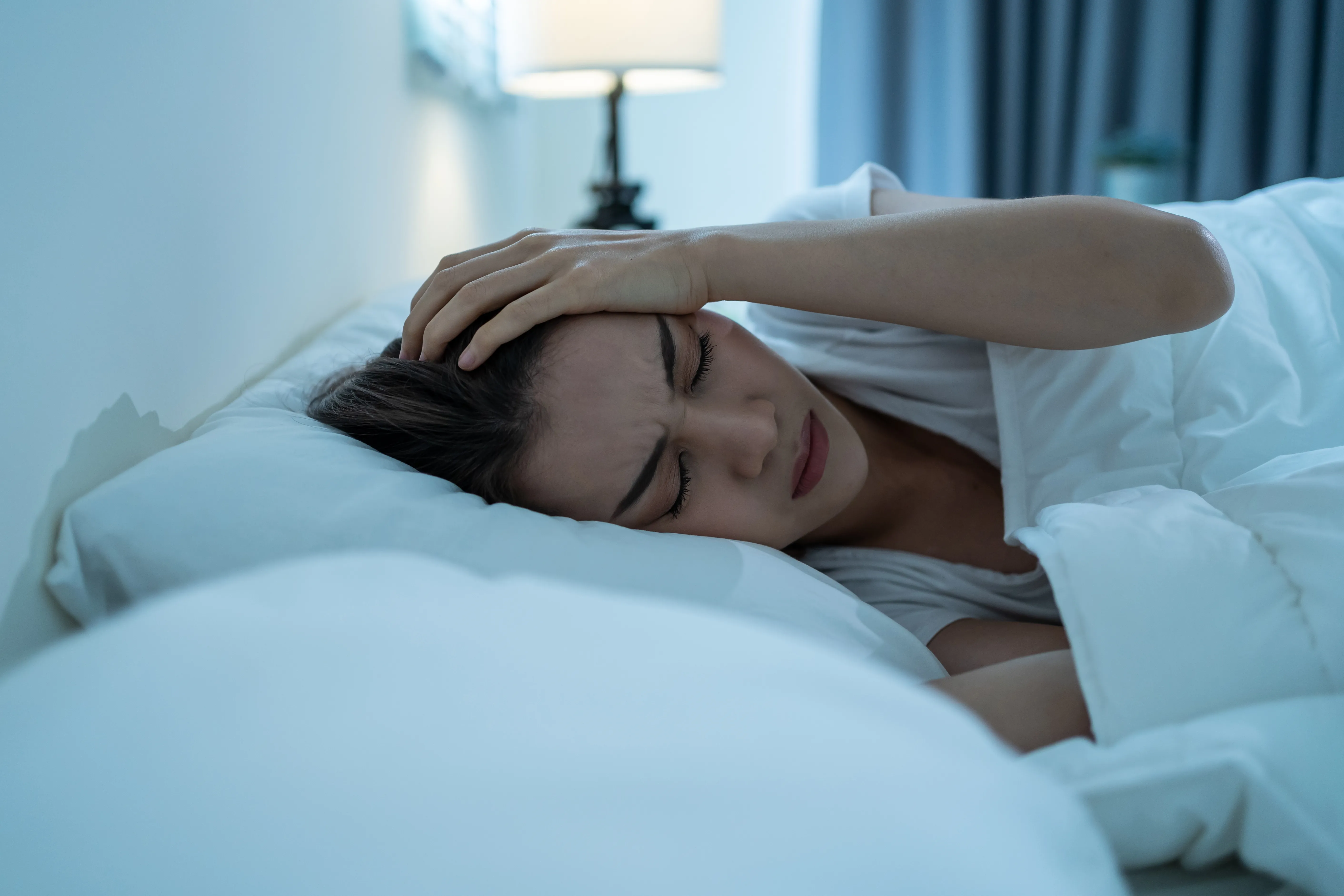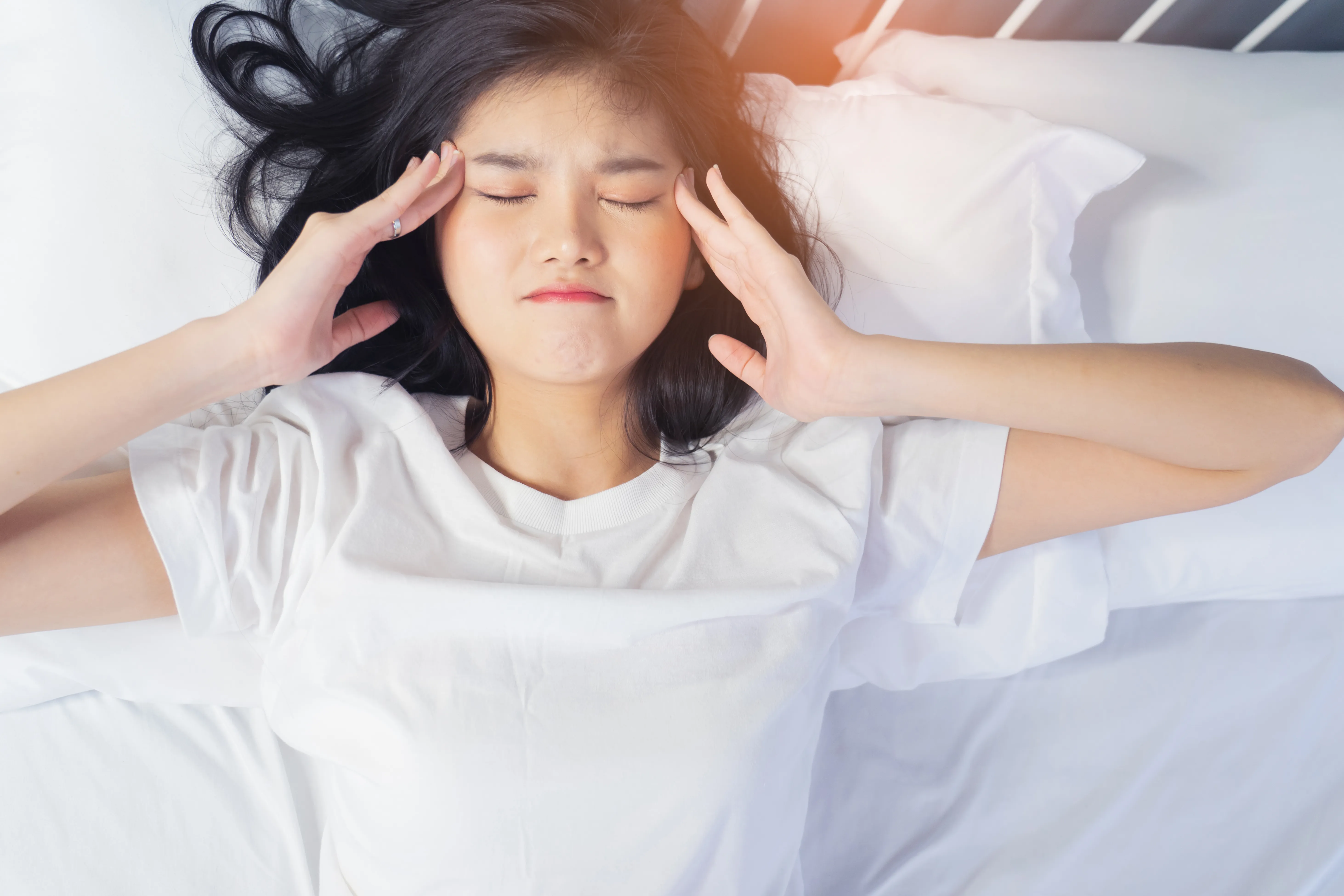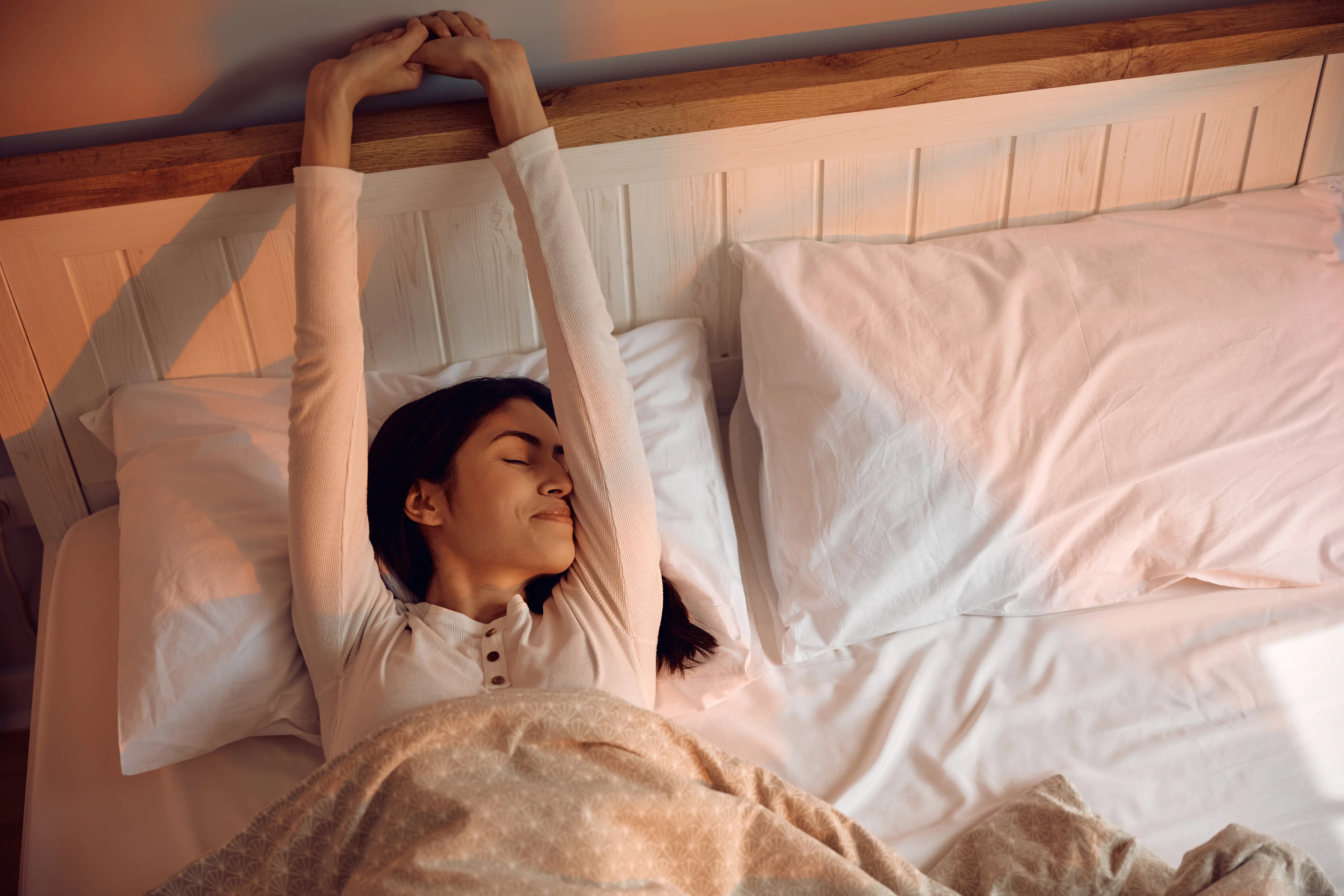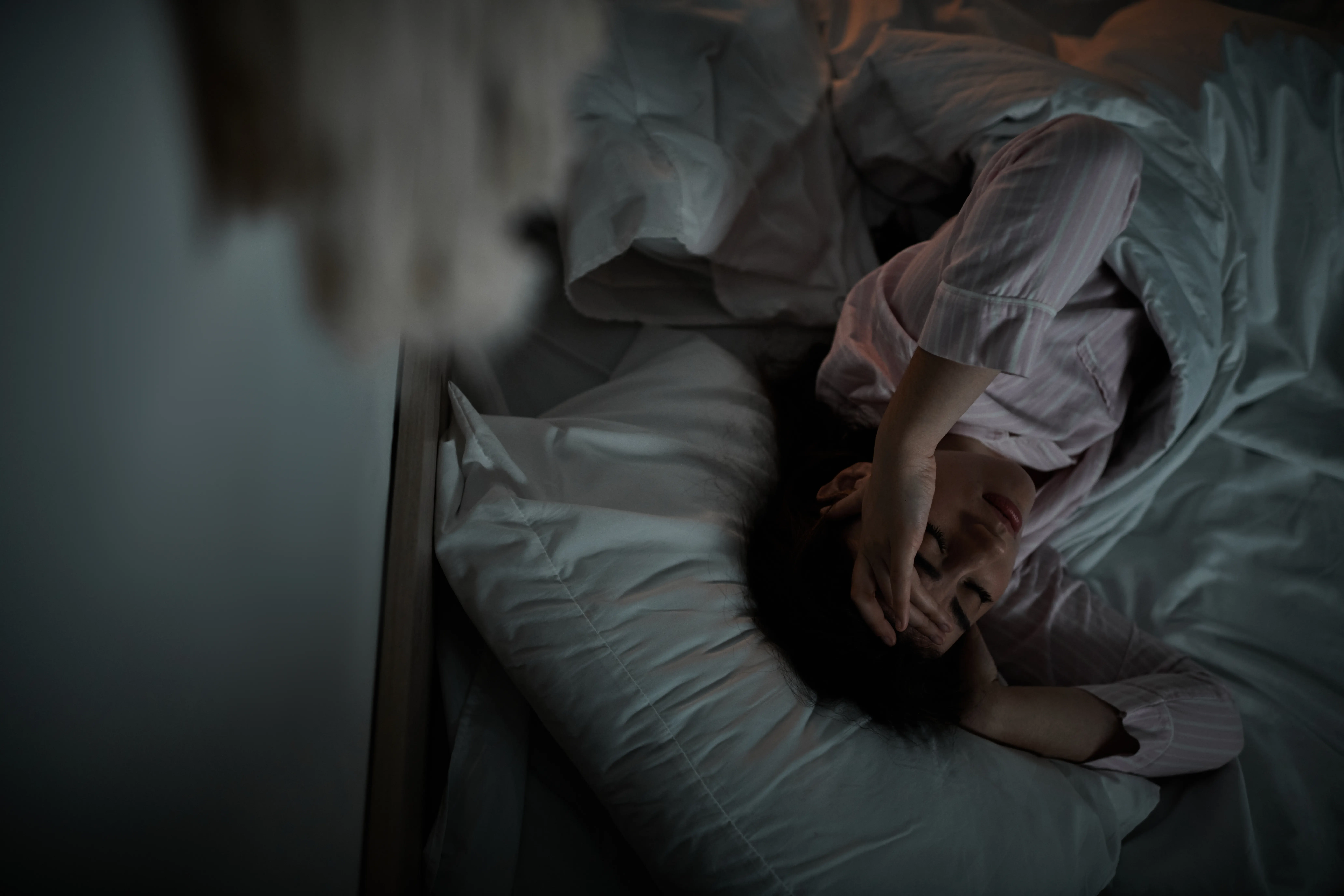Good physical health is essential for overall well-being, influencing everything from energy levels to daily comfort. One key aspect of physical health is balance, which relies on a well-functioning inner ear and nervous system. However, when something disrupts this system, it can lead to unexpected issues like vertigo.
Waking up dizzy or feeling like the room is spinning can be unsettling and is often linked to conditions such as benign paroxysmal positional vertigo (BPPV), Meniere’s disease, or vestibular migraines.
In this article, we’ll explore why vertigo happens, what its symptoms and causes are, and how to prevent it.
What is vertigo, and how does it affect sleep?
Vertigo is not a disease but a symptom of an underlying condition affecting the vestibular system (the inner ear and brain structures responsible for balance).
People experiencing vertigo may feel like their surroundings are spinning or moving, even when they are still.
Vertigo vs. Dizziness
While often used interchangeably, vertigo and dizziness are not the same. Vertigo creates a false sensation of movement, such as spinning, tilting, or swaying, while dizziness refers to a general feeling of lightheadedness, unsteadiness, or faintness.
Vertigo is more disruptive to sleep because it produces an intense, unsettling sensation of motion, making it difficult to feel stable in bed.
Common Causes of Vertigo While Sleeping

Several medical conditions can contribute to vertigo while sleeping. Below are some of the most common causes:
Benign Paroxysmal Positional Vertigo (BPPV)
BPPV occurs when tiny calcium crystals in the inner ear move into the wrong part of the ear canal, disrupting balance signals to the brain.
This leads to sudden vertigo, especially when rolling over in bed or changing positions. The dizziness is brief but intense, making it difficult to sleep. BPPV is more common in older adults and those with head injuries or prolonged inactivity.
Meniere’s Disease
Meniere’s disease causes episodes of vertigo, hearing loss, tinnitus, and ear fullness due to fluid buildup in the inner ear. Vertigo attacks can last from minutes to hours and often occur unpredictably, making sleep difficult.
High salt intake, stress, and hormonal changes can trigger difficulty in sleeping. Many people with Meniere’s disease wake up feeling disoriented and dizzy, affecting their ability to start the day normally.
Vestibular Migraines
Unlike traditional migraines, vestibular migraines cause dizziness, balance issues, and sensitivity to light and sound rather than severe headaches. Sleep deprivation, stress, caffeine, and dehydration can trigger episodes, making nighttime vertigo more common.
The sensation of motion can last minutes to hours, sometimes persisting even when lying still. Poor sleep quality can further increase the frequency and severity of attacks.
Labyrinthitis and Vestibular Neuritis
These inner ear infections cause inflammation, disrupting balance signals and leading to sudden, intense vertigo.
Symptoms may persist for days and worsen when lying down or changing positions. While labyrinthitis also affects hearing, vestibular neuritis primarily impacts balance.
Viral infections are the most common cause, and some people experience lingering dizziness for weeks even after recovering.
Low Blood Pressure
A sudden drop in blood pressure, known as orthostatic hypotension, can cause dizziness when moving from lying down to standing.
Reduced blood flow to the brain can create a temporary feeling of unsteadiness, particularly when getting out of bed. Dehydration, certain medications, and prolonged rest can worsen symptoms, making nighttime dizziness a frequent issue for some people.
Sleep Apnea
Obstructive sleep apnea (OSA) reduces oxygen levels during sleep, affecting brain function and balance. People with OSA may wake up feeling dizzy or lightheaded due to disrupted breathing.
Common symptoms include loud snoring, excessive daytime fatigue, and gasping for air during sleep. Since oxygen deprivation impacts the vestibular system, untreated sleep apnea can contribute to chronic nighttime vertigo.
Panic Attacks at Night
Nocturnal panic attacks trigger vertigo due to hyperventilation, increased heart rate, and adrenaline surges. These episodes create a sensation of spinning or dizziness, making it difficult to fall back asleep.
People with anxiety may develop a fear of bedtime, leading to further sleep disturbances. Managing stress through relaxation techniques can help reduce panic-induced vertigo.
Neurological Conditions Affecting Balance
Conditions like multiple sclerosis, Parkinson’s disease, and stroke can interfere with the brain’s ability to regulate balance, causing chronic vertigo.
Symptoms may worsen at night due to reduced external visual cues. Some people experience dizziness when turning in bed or waking up, making sleep more challenging. Managing the underlying neurological disorder is key to improving balance and reducing nighttime vertigo.
Anxiety and Stress
Chronic stress and anxiety disrupt the nervous system, increasing muscle tension and triggering dizziness. Hyperventilation from stress lowers carbon dioxide levels in the blood, worsening lightheadedness.
Many people experience a persistent sense of unsteadiness when lying down or trying to sleep. Relaxation techniques and stress management strategies can help reduce anxiety-related vertigo.
Symptoms of Vertigo While Sleeping

Symptoms of vertigo at night may vary based on the underlying cause, but common signs include:
A Spinning or Tilting Sensation While Lying Down
Many people with vertigo experience a sudden sensation of spinning, tilting, or swaying when they lie down. This sensation may be brief or last for several minutes, making it difficult to feel stable.
The intensity of the spinning feeling can vary, sometimes resembling the sensation of being on a moving boat.
Sudden Dizziness When Changing Sleep Positions
Vertigo can be triggered by simple movements, such as rolling over in bed or adjusting pillows. When the inner ear’s balance system is disrupted, even minor shifts can cause dizziness.
This can make getting comfortable at night challenging, as certain positions may worsen symptoms.
Nausea or Vomiting
The sensation of vertigo can be strong enough to trigger nausea, and in severe cases, vomiting. This happens because the brain receives conflicting signals from the inner ear and eyes, leading to motion sickness-like symptoms.
Persistent nausea at night can further disrupt sleep and lead to dehydration if vomiting occurs frequently.
A Feeling of Unsteadiness Upon Waking
People with nighttime vertigo often wake up feeling off-balance or disoriented. The dizziness may last for a few moments or continue throughout the morning. Moving too quickly upon waking, such as sitting up or standing suddenly, can make symptoms worse.
Sweating or Palpitations
Episodes of vertigo can sometimes cause excessive sweating or a rapid heartbeat, especially if dizziness is accompanied by anxiety.
The sudden loss of balance can activate the body’s stress response, leading to feelings of panic. This can be particularly distressing in the middle of the night, making it harder to fall back asleep.
Lightheadedness or Disorientation in the Dark
Some people feel more disoriented when waking up in a dark room. Since vision plays a key role in balance, the lack of visual reference points in the dark can make dizziness feel more intense. Getting up too quickly in low lighting may increase the risk of falls or bumping into objects.
How Vertigo While Sleeping Affects Daily Life
Vertigo during sleep doesn’t just disrupt rest—it can have lasting effects on overall well-being. The dizziness and imbalance experienced at night can carry over into the day, leading to fatigue, difficulty concentrating, and an increased risk of accidents.
Disrupted Sleep and Fatigue
Frequent vertigo episodes can prevent restful sleep by causing repeated awakenings throughout the night. The inability to find a stable position or the fear of experiencing dizziness can make falling and staying asleep difficult.
Increased Risk of Falls and Injuries
Since vertigo affects balance, those who experience nighttime dizziness are at a greater risk of falls, especially when getting out of bed.
The sudden onset of dizziness can make it difficult to walk steadily, increasing the chance of tripping or losing balance. This is particularly dangerous for older adults, who may suffer fractures or other serious injuries from falls.
Anxiety and Fear of Sleeping
People who frequently experience vertigo at night may begin to associate bedtime with discomfort, leading to sleep-related anxiety. The fear of dizziness can create stress and tension before bed, making it even harder to relax and fall asleep.
In severe cases, this can contribute to chronic insomnia, further worsening both vertigo symptoms and overall health.
How to Prevent Vertigo While Sleeping

Since vertigo is often linked to inner ear disturbances, blood pressure fluctuations, or sleep disorders, addressing these underlying factors can significantly reduce symptoms.
Adjusting Sleep Position to Reduce Vertigo Episodes
The way you sleep can play a major role in triggering or preventing vertigo. People with positional vertigo, such as BPPV, may find that lying on their affected side worsens dizziness.
Sleeping with the head slightly elevated using extra pillows or an adjustable bed can help keep the inner ear crystals in place, reducing vertigo episodes. Side sleeping is generally recommended over lying flat on the back, as it can help stabilize the vestibular system.
Head and Neck Positioning Tips
Poor head and neck alignment during sleep can put pressure on the inner ear and disrupt balance signals to the brain.
Using a supportive pillow that keeps the neck in a neutral position can prevent unnecessary strain. Sudden head movements, such as turning quickly in bed, can also trigger vertigo episodes, so it’s important to move slowly when changing positions during the night.
Managing Stress and Anxiety Before Bed
Stress and anxiety can contribute to vertigo by affecting the nervous system and triggering hyperventilation, which leads to dizziness.
Practicing relaxation techniques before bed, such as deep breathing, yoga, or gentle stretching, can help calm the body and reduce the likelihood of nighttime vertigo. Establishing a relaxing bedtime routine, such as reading or listening to soothing music, can also improve overall sleep quality.
Staying Hydrated and Managing Diet
Dehydration can lead to drops in blood pressure, which may trigger dizziness and vertigo. Drinking enough water throughout the day can help maintain proper circulation and inner ear function.
Limiting salt intake, especially for those with Meniere’s disease, can prevent fluid buildup in the inner ear and reduce vertigo symptoms. Avoiding alcohol and caffeine before bed can also help prevent sleep disturbances that may contribute to dizziness.
Treatment Options for Vertigo While Sleeping
The treatment for nocturnal vertigo depends on the underlying cause. Common treatment methods include:
Home Remedies and Natural Treatments
- Epley Maneuver: The Epley maneuver is a simple head movement technique used to reposition displaced inner ear crystals, which commonly cause BPPV. Performing this maneuver before bed can help realign the crystals and prevent vertigo episodes while sleeping.
- Vestibular Rehabilitation Therapy (VRT): VRT is a form of physical therapy designed to improve balance and reduce dizziness. It involves specific exercises that help the brain adapt to changes in the vestibular system. These exercises can be done at home or under the guidance of a specialist.
- Brandt-Daroff Exercises: These exercises are designed to help the brain adjust to the sensation of dizziness. By repeatedly moving between sitting and lying down positions, the inner ear can gradually become desensitized to vertigo triggers.
Canalith Repositioning Maneuvers (For BPPV)
Canalith repositioning maneuvers, such as the Epley or Semont maneuver, are effective for treating BPPV by guiding displaced crystals back to their proper position in the inner ear. These exercises can be performed by a healthcare professional or learned for at-home practice.
Medications
Certain medications can help relieve vertigo symptoms, especially for those with chronic dizziness or vestibular disorders. These medications work by targeting different causes of vertigo, from inner ear fluid imbalances to nervous system overactivity:
- Antihistamines (e.g., Meclizine): Antihistamines are often used to reduce motion sickness and vertigo symptoms by blocking signals that trigger dizziness.
- Vestibular suppressants (e.g., Diazepam, Promethazine): Vestibular suppressants help calm the nervous system and reduce dizziness, making movement feel more stable.
- Diuretics: Diuretics are commonly prescribed for Meniere’s disease to reduce fluid buildup in the inner ear, which can cause vertigo episodes.
- Migraine medications: They are used for individuals with vestibular migraines, which can cause vertigo along with headaches, nausea, and sensitivity to light.
Continuous Positive Airway Pressure (CPAP) Therapy
For individuals with sleep apnea-related vertigo, CPAP therapy can be an effective treatment. CPAP machines help maintain steady airflow during sleep, preventing oxygen deprivation and reducing dizziness upon waking.
Treating sleep apnea can also improve overall sleep quality and prevent long-term complications related to vertigo.
FAQs
Can Vertigo Get Worse While Sleeping?
Yes, vertigo can worsen while sleeping, especially if caused by BPPV. This condition occurs when tiny calcium crystals in the inner ear shift out of place, disrupting balance signals to the brain. When you lie down or turn over in bed, these crystals move, triggering dizziness. Sleeping in certain positions, such as on the affected ear, can make vertigo worse.
What Sleeping Positions Help Reduce Vertigo?
Sleeping on your back is often the best position for people experiencing vertigo. This minimizes sudden movements that can trigger dizziness, especially if vertigo is caused by BPPV. Avoid sleeping on the affected side, as it may worsen symptoms. Using an extra pillow to keep your head slightly elevated can also help by reducing fluid buildup in the inner ear.
How Can I Prevent Vertigo Episodes While Sleeping?
To prevent vertigo while sleeping, adjust your sleeping position by keeping your head elevated and avoiding sudden movements when turning in bed. Practicing balance exercises, such as the Brandt-Daroff exercises, can help your brain adapt to positional changes. Avoid alcohol and caffeine before bed, as they can worsen inner ear issues. If allergies contribute to congestion and ear pressure, use a saline spray or antihistamines before sleep.
Why Do I Wake Up Dizzy in the Middle of the Night?
Waking up dizzy can result from inner ear disorders, low blood pressure, dehydration, or sleep apnea. BPPV is a common cause, as positional changes during sleep can displace inner ear crystals, triggering dizziness. Low blood pressure (orthostatic hypotension) can also cause dizziness when moving from lying to sitting. If you have sleep apnea, disrupted breathing can reduce oxygen levels, leading to dizziness upon waking.
When Should I See a Doctor for Vertigo While Sleeping?
If vertigo is frequent, severe, or affecting your daily life, it’s important to see a doctor. Persistent vertigo can indicate an inner ear disorder, such as vestibular neuritis, Meniere’s disease, or BPPV. If dizziness is accompanied by hearing loss, ear pain, headaches, weakness, numbness, or vision changes, seek immediate medical attention, as these symptoms may signal a more serious neurological issue.
Conclusion
Vertigo while sleeping can be a distressing condition that disrupts rest, affects daily activities, and leads to anxiety about bedtime. Understanding the causes, symptoms, and effects of nighttime vertigo is essential for finding effective prevention and treatment strategies.
Simple adjustments, such as changing sleep positions, maintaining proper hydration, and managing stress, can significantly reduce the frequency and intensity of vertigo episodes.
Dom Abraham
As the lead content writer at Sleepiverse. Dom pours his heart into writing mattress reviews, bedding product reviews, and medically-reviewed health articles. Dom is from Portugal and likes to spend his free time writing on the beach as it gives him a sense of comfort. Aside from writing mattress reviews in front of the soothing beach view, Dom likes to experiment with new amazing food ideas.


